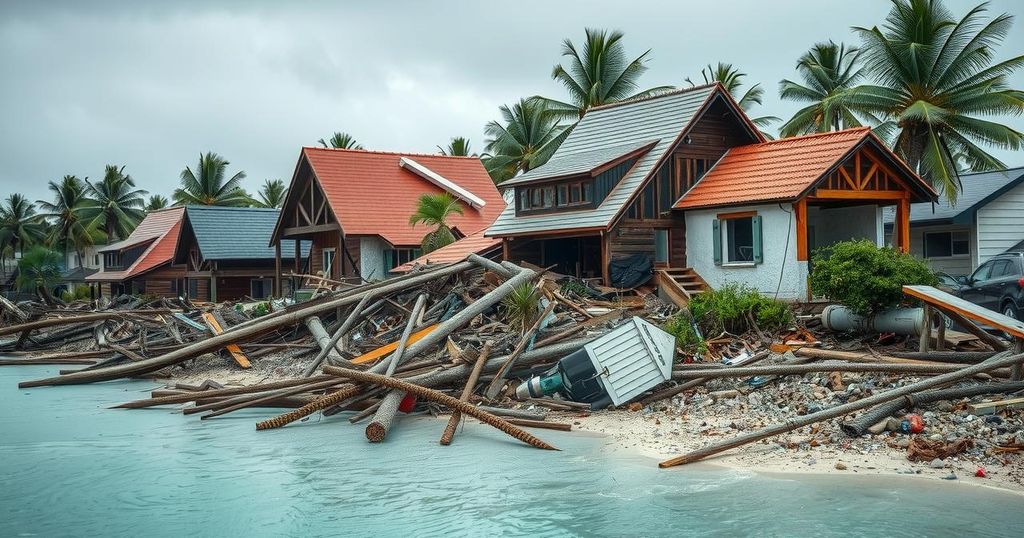Cyclone Chido Causes Tragedy in Mayotte and Mozambique’s Northern Regions

Cyclone Chido has claimed at least 11 lives in Mayotte, France’s poorest territory, before making landfall in Mozambique, threatening 2.5 million people. Intensive damage has been reported with infrastructure severely impacted. Response efforts are underway, but concerns grow over potential increases in casualties and the ongoing humanitarian crisis exacerbated by climate change.
Cape Town, South Africa – Cyclone Chido has tragically resulted in at least 11 fatalities and widespread destruction in Mayotte, a largely impoverished French territory located in the Indian Ocean. The cyclone made landfall on Sunday in Mozambique, posing further risks to an estimated 2.5 million individuals in northern Mozambique, where aid agencies remain alert to potential escalation in loss of life and destruction.
According to the French Interior Ministry, obtaining an accurate count of casualties in Mayotte has proven difficult, although confirmed reports indicate at least 11 individuals have died, with nine others reported in critical condition among 246 injuries. Chido’s intense winds, exceeding 220 kph (136 mph), designated it as a category 4 cyclone, devastating the island on Saturday as it marked the worst cyclone experienced in Mayotte in 90 years.
French authorities have noted the cyclone also significantly impacted the surrounding islands, with 11 fishermen reported missing from Comoros. The local prefect stated that Mayotte experienced extensive damage, and French Interior Minister Bruno Retailleau conveyed growing concerns surrounding the potential for a higher mortality rate in the region. Prime Minister François Bayrou confirmed public infrastructure, including the main hospital and the airport, suffered considerable destruction.
Chad Youyou, a local resident, expressed the sentiment of devastation felt across Mayotte, emphasizing, “Mayotte is destroyed … we are destroyed.” In response to the escalating crisis, France has mobilized rescuers and aid, with plans for establishing an air and sea bridge to facilitate supply delivery. Approximately 800 additional rescuers will soon be dispatched as part of initial recovery efforts focused on restoring electricity and providing clean water.
In the wake of this disaster, the President of France, Emmanuel Macron, affirmed that he is closely monitoring developments. As the cyclone progressed toward northern Mozambique, UNICEF reported that many structures in Cabo Delgado province have been either partially or completely destroyed, exacerbating the growing humanitarian crisis in the region as communities may remain disconnected from essential services for weeks.
The cyclone season, spanning December to March, has seen the southern Africa region grappling with increasingly severe storms, with previous cyclones causing significant casualties in recent years. Climate change is reportedly intensifying these natural disasters, which disproportionately affect poorer countries with minimal contributions to global warming, raising calls for greater support from wealthier nations to combat the fallout from climate-related disasters.
The article discusses the catastrophic impact of Cyclone Chido in the Indian Ocean, particularly focusing on Mayotte, a French territory, and its subsequent path to Mozambique. It highlights the humanitarian crisis spurred by the cyclone, the challenges in assessing casualties and infrastructure damages, and the readiness of authorities to respond with rescue and recovery efforts. Additionally, the article contextualizes the cyclone within the broader trends of increasing severity of storms attributed to climate change affecting vulnerable regions.
In summary, Cyclone Chido has had a devastating effect on the island of Mayotte and northern Mozambique, claiming lives and causing large-scale destruction. Authorities face challenges in addressing the immediate and long-term needs of affected communities, enhancing the urgency for international aid and support amidst escalating climate-related challenges. The article underscores the importance of addressing the humanitarian implications of such natural disasters as climate change continues to intensify their frequency and severity.
Original Source: time.com





